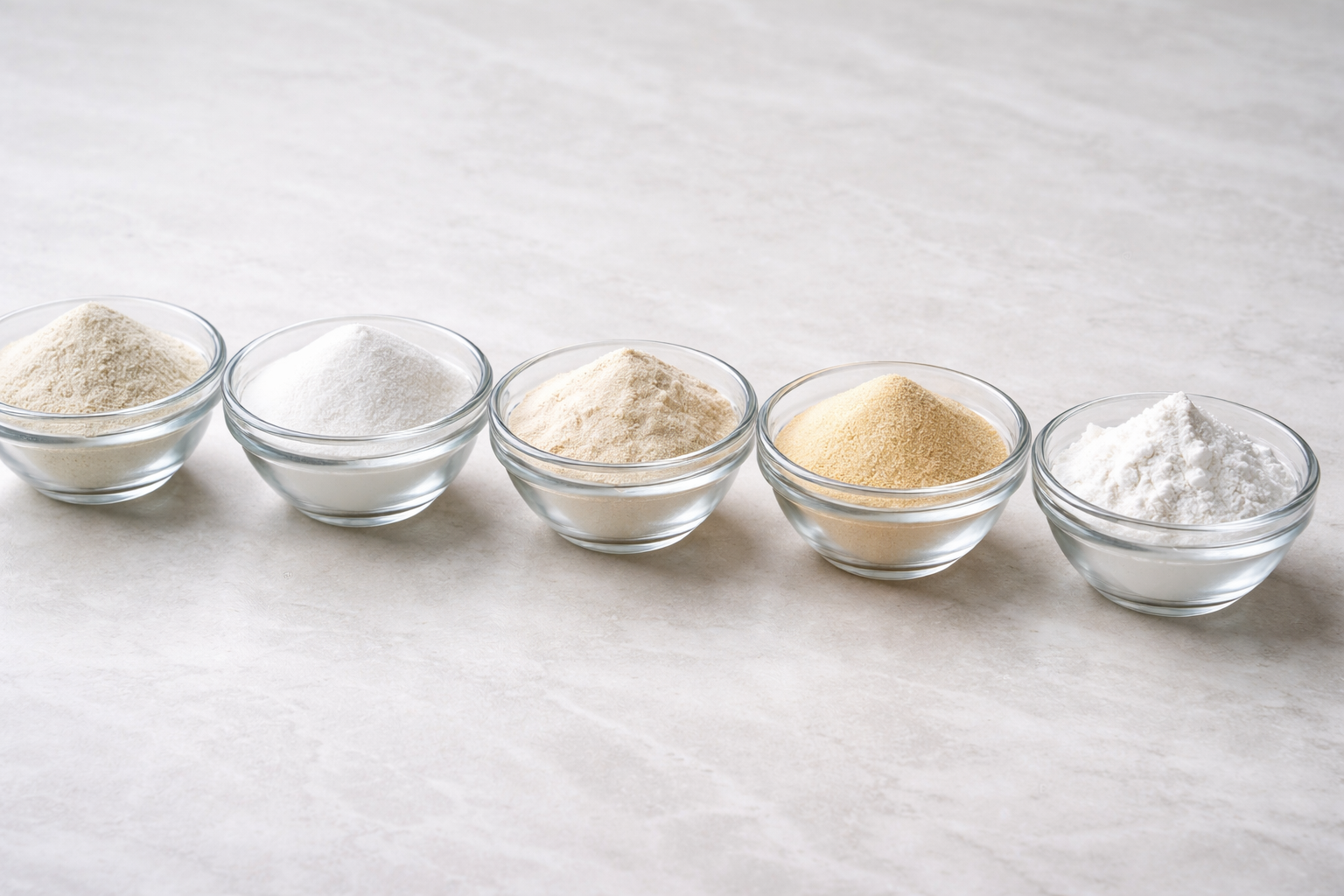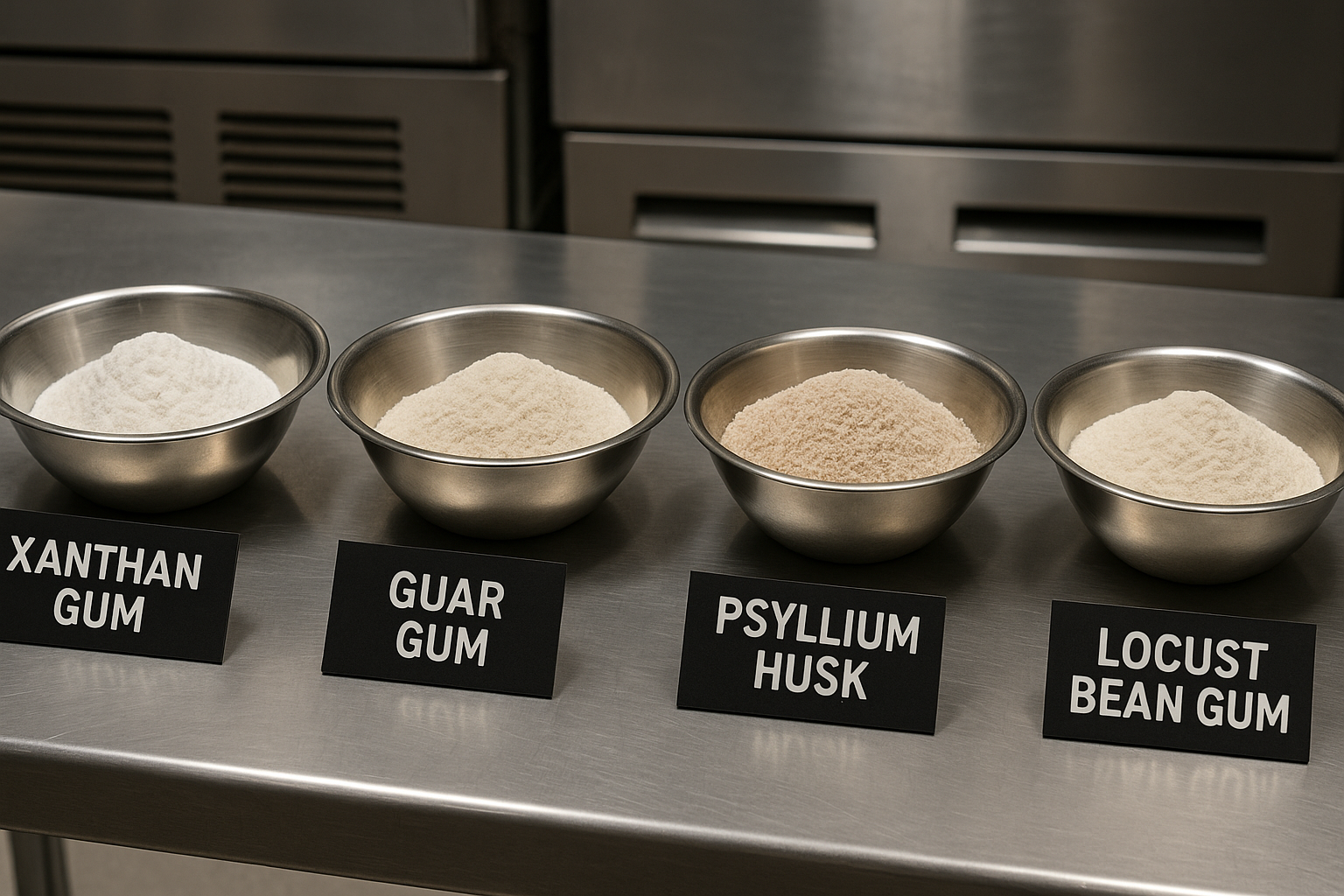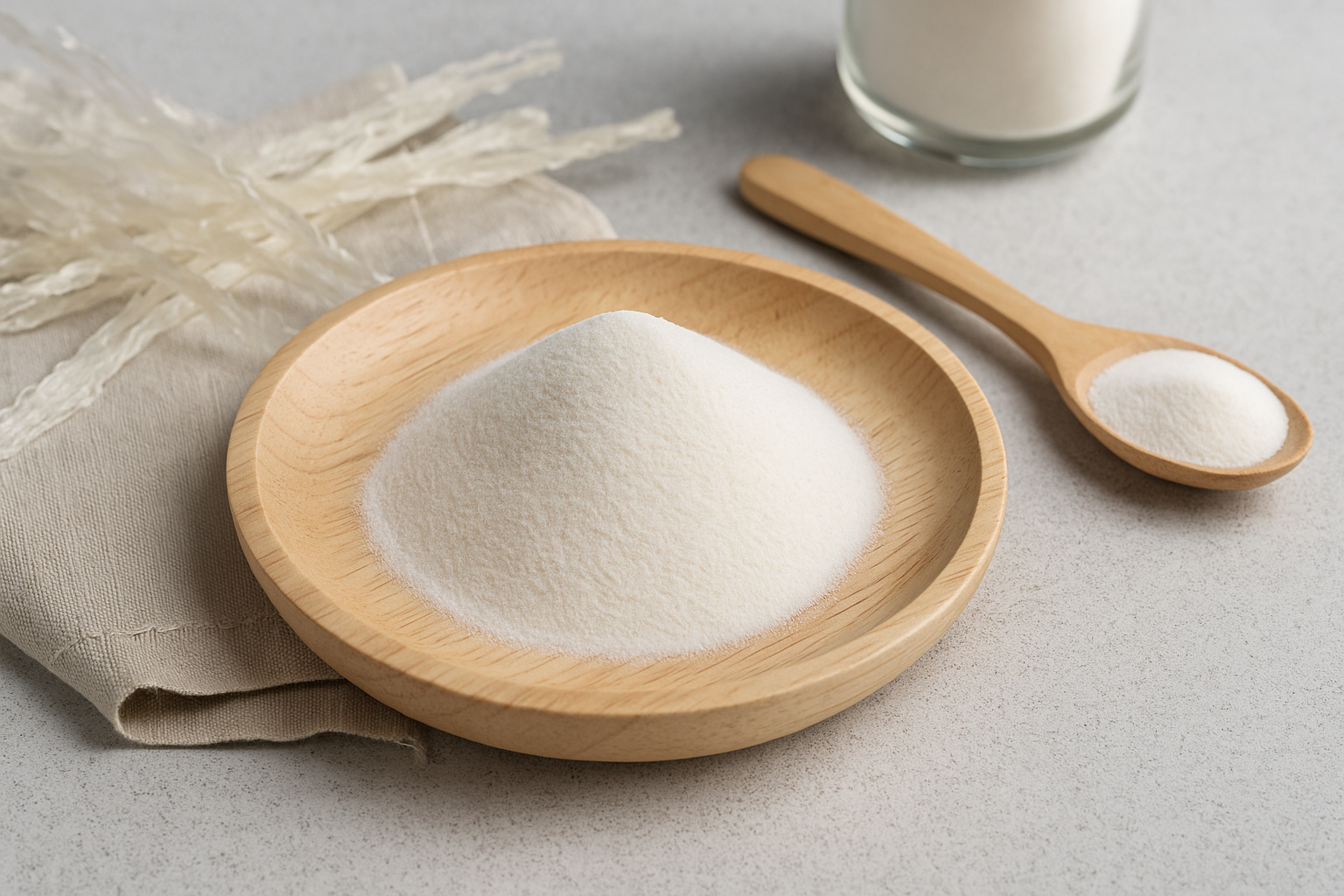
Inulin Liver Protection from Sugar Damage: A Science-Backed Guide
SUBSCRIBE TO OUR BLOG
Promotions, new products, and recipes.
Your kitchen may already hold a powerful ally in the fight against sugar-related liver damage. Recent research reveals that inulin, a prebiotic fiber found in common vegetables, could be the key to protecting your liver from the harmful effects of dietary sugar. This natural compound works through the gut-liver connection to shield one of your most vital organs from the modern epidemic of sugar overconsumption.
What Is Inulin? Natural Sources and Benefits
Inulin is a type of soluble dietary fiber found naturally in approximately 36,000 plant species. Unlike other carbohydrates, inulin passes through the small intestine undigested and reaches the colon intact, where it serves as food for beneficial gut bacteria.
This prebiotic fiber is particularly abundant in:
- Chicory root (containing 35-47g per 100g)
- Jerusalem artichoke (16-20g per 100g)
- Garlic (9-16g per 100g)
- Onions (1-7g per 100g)
- Asparagus (2-3g per 100g)
- Bananas (0.5g per 100g)
- Wheat (1-3.8g per 100g)
- Barley (0.5-1g per 100g)
Beyond its presence in natural foods, inulin is increasingly added to processed foods as a fat and sugar substitute, fiber enhancer, and for its prebiotic properties. Its growing popularity stems from mounting evidence of its health benefits, particularly its role in digestive health, weight management, and most recently, liver protection.

The Link Between Sugar Consumption and Liver Damage
The modern diet, laden with added sugars, poses a significant threat to liver health. When we consume excess sugar, particularly fructose found in processed foods and sweetened beverages, it overwhelms the liver's natural processing capacity, triggering a cascade of harmful effects:
How Sugar Damages Your Liver
- Fat Accumulation (Steatosis): Excess fructose is converted to fat in the liver, leading to non-alcoholic fatty liver disease (NAFLD)
- Oxidative Stress: Sugar metabolism produces harmful free radicals that damage liver cells
- Inflammation: Sugar triggers inflammatory responses that further harm liver tissue
- Insulin Resistance: Prolonged sugar exposure reduces the liver's sensitivity to insulin
- Fibrosis: Advanced damage can lead to scarring and impaired liver function
This sugar-induced liver damage represents a growing public health concern. An estimated 25% of adults worldwide have NAFLD, with sugar consumption being a primary driver. The condition can progress to more serious forms of liver disease if left unchecked, highlighting the urgent need for protective interventions.

How Inulin Protects Your Liver from Sugar Damage
Recent scientific research has uncovered several mechanisms through which inulin shields the liver from sugar-related harm. These protective effects operate primarily through the gut-liver axis, demonstrating the profound connection between digestive and liver health.
Gut-Liver Axis Modulation via Microbiome
The most significant way inulin protects your liver is by transforming your gut bacterial environment. When you consume inulin, it selectively feeds beneficial bacteria like Bifidobacteria and Lactobacilli, creating a healthier microbiome balance.
A 2023 study published in Nature Metabolism found that inulin-nourished gut bacteria can actually intercept and metabolize dietary fructose before it reaches the liver. This "first pass" effect prevents excess sugar from overwhelming liver metabolism and triggering fat accumulation.

Short-Chain Fatty Acid Production
When gut bacteria ferment inulin, they produce short-chain fatty acids (SCFAs) like butyrate, propionate, and acetate. These compounds provide multiple liver-protective benefits:
- Strengthen the intestinal barrier, preventing harmful compounds from reaching the liver
- Reduce intestinal inflammation that can trigger liver inflammation
- Improve liver metabolism of fats and carbohydrates
- Enhance liver antioxidant capacity to counter sugar-induced oxidative stress
- Regulate genes involved in fat storage and metabolism
- Support liver cell repair and regeneration
Anti-Inflammatory Effects
Sugar consumption triggers inflammatory processes in the liver that contribute to cellular damage. Inulin counteracts this through several anti-inflammatory mechanisms:
- Reduces production of pro-inflammatory cytokines in the liver
- Decreases activation of inflammatory immune cells
- Supports production of anti-inflammatory compounds
- Helps maintain healthy bile acid metabolism, which regulates inflammation
Blood Sugar Regulation
Inulin helps stabilize blood sugar levels, which directly benefits liver health. By slowing digestion and improving insulin sensitivity, inulin prevents the sharp glucose spikes that can overwhelm liver metabolism and lead to fat accumulation.
A 2021 randomized controlled trial published in Journal of Functional Foods found that participants consuming 10g of inulin daily for 8 weeks showed significant improvements in fasting blood glucose, insulin resistance markers, and liver enzyme levels compared to the control group.

Recent Scientific Evidence for Inulin Liver Protection
The protective effects of inulin against sugar-induced liver damage are supported by a growing body of scientific research. Here are five recent studies highlighting these benefits:
Study 1: University of California, Irvine (2023)
Published in Nature Metabolism, this groundbreaking study discovered that inulin transforms gut bacteria to consume harmful dietary fructose before it reaches the liver. Researchers found that inulin supplementation not only prevented but could actually reverse early signs of fatty liver disease by reducing fat deposits and enhancing the liver's antioxidant capacity.
Key Finding: Inulin-fed gut microbes can intercept and metabolize fructose, preventing liver fat accumulation.
Study 2: Tehran University of Medical Sciences (2022)
This randomized controlled trial published in Clinical Nutrition involved 80 patients with non-alcoholic fatty liver disease. Participants receiving 10g of high-performance inulin daily for 12 weeks showed significant reductions in liver fat content (measured by ultrasound), improved liver enzyme profiles, and reduced inflammatory markers compared to the placebo group.
Key Finding: Inulin supplementation reduced liver fat content by 15% and liver enzymes by 22% in NAFLD patients.
Study 3: King's College London (2021)
Research published in Gut examined the metabolic effects of inulin in subjects with prediabetes. The 16-week intervention demonstrated that inulin supplementation significantly reduced liver fat accumulation, improved insulin sensitivity, and enhanced markers of metabolic health compared to cellulose fiber supplementation.
Key Finding: Inulin specifically targets liver fat reduction even in the presence of continued sugar consumption.

Study 4: University of Georgia (2020)
A study in the Journal of Nutritional Biochemistry used animal models to investigate how inulin protects against high-fructose diets. The research demonstrated that inulin supplementation prevented fructose-induced liver steatosis by modulating gut permeability, reducing endotoxin levels, and decreasing hepatic inflammation.
Key Finding: Inulin strengthens the gut barrier, preventing harmful compounds from triggering liver inflammation.
Study 5: Mashhad University of Medical Sciences (2020)
This meta-analysis published in the European Journal of Clinical Nutrition reviewed 33 randomized controlled trials investigating inulin's effects on metabolic health. The analysis confirmed that inulin supplementation significantly improved liver function tests, reduced inflammatory markers, and enhanced glycemic control across diverse populations.
Key Finding: Consistent evidence across multiple studies supports inulin's liver-protective effects.
Practical Tips: How to Incorporate Inulin for Liver Protection
Simple Ways to Add Inulin to Your Daily Diet
Practical Tips: How to Incorporate Inulin for Liver Protection
Recommended Daily Inulin Intake
Based on the scientific research, here are the recommended daily inulin intakes for liver protection:
| Purpose | Recommended Daily Intake | Notes |
|---|---|---|
| General health maintenance | 5–8 g | Good starting point for most healthy adults |
| Liver protection (preventive) | 8–10 g | Optimal for those concerned about sugar consumption |
| Therapeutic (existing liver issues) | 10–15 g | Use under healthcare provider supervision |
Important: Start with a low dose (2–3 g daily) and gradually increase over 2–3 weeks to allow your digestive system to adjust. This helps minimize potential side effects like bloating or gas.
Natural Food Sources of Inulin

Chicory Root
The richest natural source with 35–47 g per 100 g. Available as whole root or chicory coffee substitute.

Jerusalem Artichoke
Contains 16–20 g per 100 g. Roast, mash, or add to soups for a nutty flavor.

Garlic
Contains 9–16 g per 100 g. Just 2–3 cloves daily provide beneficial amounts.

Onions
Contains 1–7 g per 100 g. All varieties (red, yellow, white) provide inulin.

Asparagus
Contains 2–3 g per 100 g. Highest in the tender tips.

Dandelion Greens
13–15 g per 100 g in the root. Use in salads or as tea.
Inulin Supplements
For those who find it challenging to consume sufficient inulin through diet alone, supplements offer a convenient alternative:
- Powder form: Versatile—mix into beverages, smoothies, or foods
- Capsules: Convenient for precise dosing and travel
- Chicory root extract: Highest concentration of inulin
- Jerusalem artichoke supplements: Natural source with additional nutrients
- Inulin-FOS blends: Combines inulin with fructooligosaccharides for enhanced prebiotic effects
- Prebiotic mixes: Inulin combined with other beneficial fibers

Ready to Protect Your Liver with Inulin?
Whether you choose to increase inulin-rich foods in your diet or opt for supplements, taking this step can significantly support your liver health against sugar damage.
Learn More About Inulin ResearchSimple Ways to Add Inulin to Your Daily Diet

- Add inulin powder to morning smoothies or oatmeal
- Replace coffee with chicory root coffee (naturally high in inulin)
- Include garlic and onions as base ingredients in cooking
- Roast Jerusalem artichokes as a side dish
- Use inulin powder as a sugar substitute in baking (start with small amounts)
- Add sliced asparagus to salads and stir-fries
- Brew dandelion root tea for an inulin-rich beverage

|
About the Author Ed is the founder of Cape Crystal Brands, editor of the Beginner’s Guide to Hydrocolloids, and a passionate advocate for making food science accessible to all. Discover premium ingredients, expert resources, and free formulation tools at capecrystalbrands.com/tools. — Ed |
Enjoyed this post? Subscribe to The Crystal Scoop
Food-science tips, ingredient know-how, and recipes. No spam—unsubscribe anytime.
- Choosing a selection results in a full page refresh.



